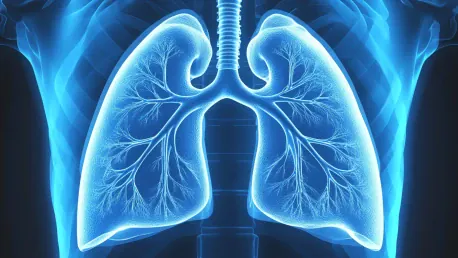Recent findings illuminate the potential benefits of BIO 300, an oral suspension aimed at improving lung function in COVID-19 patients following hospital discharge. Results from a Phase 2 clinical trial, conducted by Humanetics Corporation, underscore the drug’s ability to significantly enhance pulmonary capacity and overall quality of life for COVID-19 survivors. Although the trial involved fewer participants than initially planned, the outcomes reveal promising indications for those treated with BIO 300.
Promising Results from the Clinical Trial
Improvements in Pulmonary Function
The clinical trial, conducted across multiple sites in the United States, enrolled 38 participants with the goal of comparing lung function, exercise capacity, and quality of life between those treated with BIO 300 and a placebo group. Despite the study falling short of the intended 50 participants, significant improvements were observed in the 20 participants who received BIO 300. One striking outcome was the substantial enhancement in forced expiratory volume in one second (FEV1), a critical measure of pulmonary function. This improvement was sustained for up to 12 months after treatment, showcasing the long-term benefits of BIO 300 for lung health.
The pulmonary enhancements were not limited to FEV1. Participants treated with BIO 300 also exhibited marked improvements in diffusing capacity of the lung for carbon monoxide (DLCO) and forced vital capacity (FVC), measured at 12 weeks, 6 months, and 12-month intervals. These metrics are crucial indicators of lung efficiency and overall respiratory health, suggesting that BIO 300 can effectively aid in the recovery of lung function in COVID-19 survivors. The study’s findings offer a compelling case for expanding the use of BIO 300 beyond the initial trial, considering its potential to address ongoing pulmonary challenges post-COVID-19.
Impact on Quality of Life
In addition to the positive effects on lung function, patients treated with BIO 300 also reported notable improvements in their quality of life. Using the St. George’s Respiratory Questionnaire, researchers measured quality of life at both 6 and 12 months post-treatment. Patients receiving BIO 300 consistently exhibited trends toward better outcomes, highlighting the drug’s role not only in physical recovery but also in enhancing the overall well-being of survivors. This is particularly significant given the prolonged recovery experienced by many COVID-19 patients.
Quality of life is a multifaceted measure that encompasses physical, emotional, and social dimensions. The trends towards improved quality of life in the BIO 300 group underscore the importance of comprehensive treatment approaches that address various aspects of recovery. These findings suggest that beyond improving lung function, BIO 300 may help alleviate some of the broader impacts of COVID-19, contributing to a more holistic recovery process for patients who have endured severe illness. Such improvements are especially valuable as the world continues to grapple with the long-term effects of the pandemic.
Safety and Broader Applications
Tolerability and Safety Profile
One of the key considerations in any clinical trial is the safety and tolerability of the investigational drug. The Phase 2 trial of BIO 300 revealed that the drug was well-tolerated by participants, with adverse events in line with expectations for the patient demographic. Crucially, no new safety concerns emerged during the trial, providing reassurance regarding the drug’s safety profile. This favorable safety data supports the continued exploration of BIO 300 in larger, more diverse patient populations to confirm and expand upon these findings.
Michael Kaytor, PhD, Vice President of Research and Development at Humanetics, expressed optimism about the potential of BIO 300 to improve patient outcomes. This sentiment is supported by the absence of new safety issues during the trial, suggesting that BIO 300 could be a viable option for broader use in managing post-COVID-19 pulmonary conditions. Confidence in the safety and efficacy of BIO 300 is crucial for its acceptance and adoption in clinical practice, especially as healthcare providers seek effective treatments for long COVID and similar conditions.
Broader Applications of BIO 300
Recent findings shed light on the potential advantages of BIO 300, an oral suspension developed to improve lung function in COVID-19 patients post-hospitalization. Conducted by Humanetics Corporation, a Phase 2 clinical trial highlights the drug’s capacity to significantly enhance pulmonary function and overall quality of life for those who have recovered from COVID-19. Although the study had fewer participants than originally intended, the results indicate promising benefits for patients treated with BIO 300.
This drug is aimed at those struggling with long-term respiratory issues following recovery from the virus. By supporting lung health, BIO 300 helps patients regain strength more quickly and return to their pre-COVID lives. The trial’s positive findings are important, especially as the world continues to manage the long-term effects of the pandemic. Ongoing research and further trials will be essential to confirm BIO 300’s efficacy and ensure it becomes a mainstay in post-COVID-19 treatment, offering hope to both survivors and the medical community.









